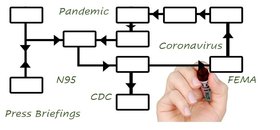A New Progressive Agenda for Public Health and the Environment, a project of the Center for Progressive Regulation.

A New Progressive Agenda for Public Health and the Environment, a project of the Center for Progressive Regulation. A brief summary of policy recommendations from CPR's A New Progressive Agenda for Public Health and the Environment. White Paper 501, January 2005.
Webinar: Achieving Social Justice Through Better Regulation

Following up on CPR's June 2019 Regulation as Social Justice Conference, and the subsequent report on it, on December 11, 2019, Anne Rolfes of the Louisiana Bucket Brigade and CPR's Amy Sinden and James Goodwin discussed the future of regulation, and how it can do a better job of serving the interests of the political dispossessed.
Opportunity Wasted: The Obama Administration's Failure to Adopt Needed Regulatory Safeguards in a Timely Way is Costing Lives and Money

In April 2011, CPR issued a white paper in which a group of Member Scholars and Policy Analysts identified 12 key health, safety, and environmental regulatory actions slowly working their way through the Obama Administration’s regulatory pipeline. In the white paper, Twelve Crucial Health, Safety, and Environmental Regulations: Will the Obama Administration Finish in Time?, the authors warned that the Administration’s failure to adopt a sense of urgency with respect to completing its work had opened the door to the very real prospect that nine of the twelve regulatory actions might get caught up in the backwash of the 2012 presidential campaign, and indeed might never be completed by the current Administration. In this report, CPR follows up to see how the Administration has done.
Corporate Violence as Crime: Anniversary of the West Virginia Chemical Spill

In 2014, about 300,000 people in and around Charleston, West Virginia, lost their drinking water source when thousands of gallons of a toxic chemical known as MCHM (4-methylcyclohexanemethanol) leaked into the nearby Elk River through a hole in a rusted-out storage tank. In 2015, the wheels of justice began to catch up with the owners of the responsible company when they were indicted by U.S. Attorney Booth Goodwin. Coincidentally, the West Virginia indictments came down on the same day that the Justice Department charged 14 people in Massachusetts for their role in producing and distributing meningitis-tainted steroid injections that killed 64 people. Rena Steinzor in Huffinton Post on prosecuting corporate violence.
Deconstructing Regulatory Science

Writing for The Regulatory Review, Rena Steinzor and Wendy Wagner observe that "The U.S. Environmental Protection Agency (EPA) Administrator Scott Pruitt recently opened another front in his battle to redirect the agency away from its mission to protect human health and the environment. This time, he cobbled together a proposed rule that would drastically change how science is considered during the regulatory process."
Rep. Mary Gay Scanlon Should Hold Biden’s Feet to the Fire on Regulatory Agenda

In the midst of this long dark winter, it’s heartening to see the Biden administration lay out a bold agenda for a more secure, fair, and sustainable future. Holding the Biden administration to its promise to reform the regulatory process to “ensure swift and effective federal action” to “improve the lives of the American people” is a crucial part of that effort. From her perch on a key congressional committee with oversight over agencies and the rulemaking process, the Delaware Valley’s own Rep. Mary Gay Scanlon is well-positioned to do just that.
Attention, Lawmakers -- Regulation Is More Popular Than You Think

Amid the Sturm und Drang (storm and stress) of politics these days, one fact stands out — a large majority of Americans want more regulatory protection in a wide variety of areas, according to a recent poll of likely voters. The results are consistent with previous polls that indicate that Americans understand the importance of government regulation in protecting them from financial and health risks beyond their control. They also indicate majority support for efforts by the Biden administration to renew government regulation — as well as a stark repudiation of former President Trump’s extreme anti-regulatory agenda.
Enron's Collapse 20 Years Later -- Lessons Not Learned

In December 2001, the wunderkind energy company Enron collapsed spectacularly, destroying $67 billion in assets held by mutual funds, retirees and individual stock investors. Some commentary 20 years later has focused on how Enron heralded the first of companies making money by “disruption"—even as some of this disruption also led to negative impacts on society. There is no doubt that, like Facebook, even Enron’s legitimate money-making enterprises had some negative spillovers as a side effect of wealth creation by innovation. But the problem isn’t with the idea of seeking innovation or testing disruptive ways of doing things; the problem is that government regulators, then and now, have been starved of their ability to effectively channel market forces and private innovation to wealth creation while avoiding negative externalities. Truly supporting the private sector, innovation, and wealth creation, requires more government regulation, not less.
Opinion Overturning Roe and Casey Abandons the Rule of Law, Underscores Need for Americans to Reclaim Our Court

Today's U.S. Supreme Court opinion in Dobbs v. Jackson Women’s Health Organization warrants unqualified condemnation and sends a chilling warning that the Court's conservative majority has embraced extremism and abandoned the rule of law, putting longstanding rights and protections in grave danger.
New Poll Finds Strong Bipartisan Support for Building a Modernized, People-Centered Regulatory System

The U.S. public strongly backs legislation that would overhaul the nation’s regulatory system by ending corporate dominance of the federal rulemaking process and enabling government agencies to better protect people and the planet, according to a new poll released today by the Center for Progressive Reform and Data for Progress.



































































